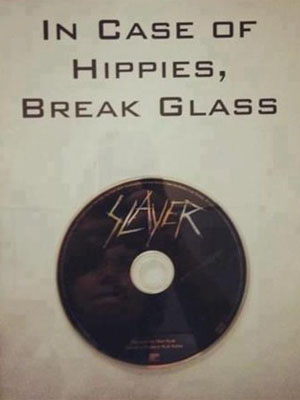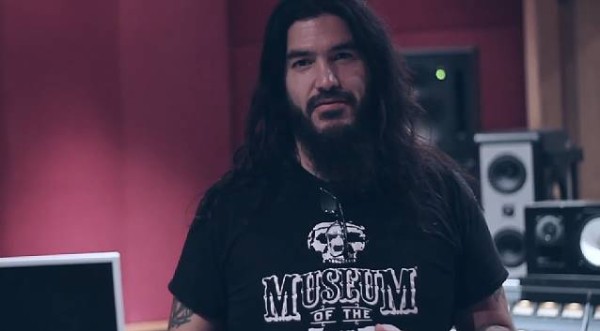 Like most of you, I experience a prevalence of dual-use time in my life. That is, I have to be here at the computer doing something, but like most things in “mature” “adult” “responsible” society it takes half a brain at best, so I put on some tunes and shift most of my brain and mind that way.
Like most of you, I experience a prevalence of dual-use time in my life. That is, I have to be here at the computer doing something, but like most things in “mature” “adult” “responsible” society it takes half a brain at best, so I put on some tunes and shift most of my brain and mind that way.
Originally, back in the dire proto-technological days of the 1980s, we had to manually throw on an LP, CD or cassette to hear music. Otherwise, there was the radio, but there wasn’t as much choice there. Radio was both the last resort, and a way to hear new music. It served a sacred role in the latter and could be an event in its role as the former.
If the rare metal show in your area showed up only one night a week, that became party night while you and your buddies checked in for the weekly connection to the world of metal. Sometimes, it was just for fun. It was easier to let someone else DJ and pick the tunes, and if the price you had to pay was every third tune being a stinker, no big deal.
Then in the late 1990s, people started getting crazy with the multi-disc changers. Now you could have five or six discs in rotation and just let them roll. Put in what you wanted, throw it on repeat, and listen for three hours or longer. I used to put my Harmon-Kardon on shuffle repeat and bathe people in music of disparate form but similar content, which created an immersive wave of exploration in that topic.
But it all changed with broadband and the evolution of the MP3 codec. When we launched our radio station back in 1997, the Frauhnofer MP3 codec we used was really excellent. But since that time, innovations have occurred in variable bit rate, compression and sound dynamics that add on to that strong basis. Now MP3s are a better delivery mechanism than tape and, given adjustments for physical electronics degrading sound, almost as good as CD.
Listening to music via MP3 was different however. Generally, you saved a ton of MP3 files to some directory on your Winchester disk. Then you pitched those into a playlist and started somewhere. The player would, like a merciless harvester of ears, keep going until you told it to stop. So it was more like tuning into a radio station whose playlist you chose, but one which favored sequential albums. You could also randomize.
The problem with this style of listening — as you’ve guessed, doubtless, being the intelligent reader — is that it’s autopilot. Want to listen to Slayer? With two clicks you’ve launched everything beginning with “S,” and then the playlist begins again when it runs out of those. You can conceivably keep your entire record collection streaming in the background.
However that loss of choice can be disturbing. You’re no longer choosing to listen to something past the first choice. You get caught up in the playlist. If you randomize, it’s only a little bit better. In the end, it’s like radio without the human intervention of the DJ, and takes power away from you.
This is why I’ve come to enjoy YouTube. It’s like putting an LP on the record player more than anything else. I think of an album; I type the name and “full album” (LOL search engines) into YouTube, and up pops a version of it. I hit play, and sit back and listen to it. But then comes the magic: when it’s done, it’s done. I have to manually, physically and deliberately choose another piece of music or sit in silence.
In this, I get the best of both worlds. The (nostalgia aside) beauty of choice, where you have to walk to the shelves, think of an album, find it according to your filing system, and then manually put it on the player. And yet, the promise of digital technology and convenience of MP3s: no record you can scratch, no CD you can fumble, no cassette to entangle. The two are united by typing that search into the YouTube site.
There’s some ethical issues of course. I’d be happier if all bands posted official full albums so I could kick them the $0.02 per play that YouTube pays. In the end, that might pay more than traditional record contracts; I don’t know. Most bands don’t seem to care, as many of us using YouTube are doing so in places where we can’t bring our record collections, like work, friends’ houses, church, missile silo, etc.
But at the end of the day, what really matters about music is preserving the magic. That sense that behind the next corner, something amazing lurks. A buried treasure; an undiscovered secret. An explosion of imagination, or emotion, or even pure logical calculation. That life is ongoing, and infinite, and we’ll always find something new to quest after.
Ultimately, this is what makes YouTube compelling. It requires a choice. There is no constant rolling playlist. I must go to the site, type in the band name and album name, and start the process. This makes me the person in charge who then rapidly loses control as the music sweeps over me. This is the experience of listening, and in this sense, YouTube brings back the beauty of the LP with the convenience of the iPod.
9 CommentsTags: listening, rant



